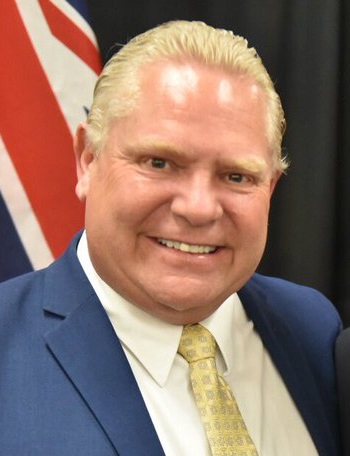
OTTAWA — Doug Ford’s resounding victory in the country’s most populous province is bad news for Prime Minister Justin Trudeau on the federal-provincial relations front — particularly on the climate change file where the two are on a “collision course,” as one veteran Liberal MP candidly admitted Friday.
But that doesn’t mean it’s necessarily bad news for Trudeau politically. Indeed, history suggests the ascendancy of Ford’s Conservatives in Ontario may actually turn out to be good news for Trudeau’s federal Liberals.
First, the bad news for the prime minister.
With Thursday’s decimation of Kathleen Wynne’s Liberals, Trudeau has lost a dependable and trusted ally on any number of federal-provincial files, including climate change. Instead, he’ll have to deal with Ford, a bombastic populist who represents the antithesis of pretty much everything Trudeau stands for.
“Clearly, Mr. Ford’s agenda is not the same agenda as Mr. Trudeau’s and so I think federal-provincial relations will be a bit more challenging,” long-time Toronto Liberal MP John McKay said Friday.
Ford won a commanding majority on a platform that included a pledge to scrap Ontario’s cap-and-trade carbon pricing system. And he’s vowed to join Saskatchewan in challenging any attempt by the federal government to impose a carbon price on the provinces, going all the way to the Supreme Court if necessary.
Under federal legislation, all provinces have until the end of this year to enact carbon pricing plans and, if they don’t meet federal standards, a national price will be imposed on them — which, as McKay conceded, puts Trudeau ”on kind of a collision course” with Ford.
“You can’t sugar-coat this one … we are committed to pricing carbon, period, end of story.”
Sarnia Conservative MP Marilyn Gladu said Ford’s victory should be a “wake-up call” for Trudeau, warning him that Canadians think his carbon tax is “just a tax grab for the government.” She pointed out that Alberta could be next to drop out of the pan-Canadian carbon pricing plan if United Conservative Leader Jason Kenney defeats Premier Rachel Notley’s NDP next May.
However, Manitoba Premier Brian Pallister, a fellow Conservative, injected a note of caution. He warned “there’ll be tremendous complexity in dismantling” Ontario’s membership in a cap-and-trade market with Quebec and California and that it will cost “billions of dollars in expense for the government of Ontario to unwind that system” of auctioning off greenhouse gas emissions allowances.
Ontario’s fourth auction last November alone generated more than $422 million in proceeds, which by law are to be invested in programs to reduce carbon pollution.
Still, federal Conservative Leader Andrew Scheer expressed his satisfaction at gaining an ally in the fight against Trudeau’s “carbon tax.” And just as Ontarians rejected Wynne’s deficit-driven, big spending policies, he predicted they’ll reject her policies (that is, Trudeau’s) at the federal level in 2019.
If so, they’ll be bucking historical trends.
Since Confederation, Ontario voters have almost always opted for a different party federally than the one they’ve chosen provincially — even when that’s meant electing a premier and prime minister guaranteed to be at each other’s throats.
From 1995 to 2002, Conservative Premier Mike Harris and the Liberal prime minister of the day, Jean Chretien, were openly at war with each other. Yet, in two federal elections during that period, Chretien managed to sweep almost every seat in the province.
Trudeau and Ford both appear to be taking pains to get their relationship off to a collegial start. The prime minister called Ford on Thursday night to congratulate him and Ford said he told Trudeau he stands united behind him in his fight against U.S. President Donald Trump’s imposition of crippling tariffs on Canadian steel and aluminum imports.
But Liberal MPs’ reaction demonstrated the potential for that relationship to quickly sour.
In pondering the lessons for the federal Liberals from the Ontario result, McKay said they need to ask “why would people embrace such a manifestly obvious unqualified candidate for premier; what is it that drives people to make those decisions that many of us would regard as almost irrational?”
And fellow Toronto Liberal MP Adam Vaughan, asked about Ford’s reluctance to talk about LGBTQ rights, commented acerbically: “I’d be surprised if he knows the other 26 letters in the alphabet too.”
But just as Chretien ran against Harris, Trudeau may find the polarizing Ford to be a useful foil for demonstrating his progressive values in the next federal campaign.
As well, Ford’s own history and penchant for controversy could bite his federal Conservative cousins, which may explain why Scheer has kept a bit of distance thus far.
Straight-laced Scheer got a taste of that earlier this week when he was asked how he feels about being associated politically with someone who allegedly dealt drugs in his youth and whose family members, notably late Toronto mayor Rob Ford, have struggled with drug addiction. Scheer awkwardly talked about how he’s always had compassion for people struggling with substance abuse.
However, in the short term at least, Scheer may be right in hoping that Ford’s success will rub off on federal Conservatives. For that matter, Andrea Horwath’s strong showing, vaulting the NDP into official Opposition status in Ontario, may also give a boost to federal New Democrats.
But, as former NDP leader Tom Mulcair can attest, the spill-over effect from provincial elections can be ephemeral.
In the weeks immediately following the NDP’s stunning 2015 breakthrough in Alberta, Mulcair’s federal party vaulted into the lead in national public opinion polls, riding Notley’s coattails. Once voters focused on the federal election campaign a few months later, however, that lead evaporated. Mulcair’s NDP wound up placing a distant third.